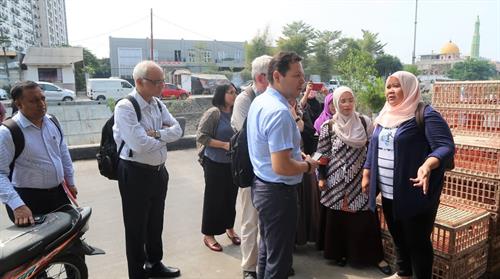The Extended Spectrum Beta Lactamase (ESBL) producing E. coli (ESBL-Ec) - The Tricycle Project is a collaborative work between the Ministry of Health (MoH), Ministry of Agriculture (MoA), and Ministry of Environment and Forestry (MoEF) utilising a One Health approach. Preparations for this pilot project started in 2017 when several microbiologists, epidemiologists, and a public health specialist undertook training in Utrecht (in the Netherlands) and Jakarta.
The project aims to implement a simplified, integrated trans-sectorial surveillance system for bacterial resistance to antibiotics on a global basis. Implementation in Indonesia began in November 2018 and the sample collection for the project will be completed next month.
From 12-16 August, a team of experts and WHO staff consisting of Mr. Jorge Matheu (WHO HQ), Dr. Shivaramu K. Veerappa (North Carolina State University, United States of America), Dr. Jaap Wagenaar (WHO Collaborating Centre at the University of Utrecht, the Netherlands), and Dr. Manish Kakkar (WHO SEARO) visited Jakarta to provide technical assistance on the implementation of this project.
During the first two days of the visit, the team facilitated a training on WHOnet, which was attended by a national team from hospitals, National Institute of Health Research and Development (NIHRD), MoH, MoA, MoEF, and the Food and Agriculture Organization (FAO) Indonesia. The training helped participants perform and analyse antimicrobial resistance data in laboratory sites and at the national level.
The team also conducted a monitoring visit to Rumah Sakit Persahabatan, Health Center Jatinegara, the slaughter house/market, the canal, the microbiology laboratory in NIHRD, and the microbiology laboratory in the Ministry of Environment. Findings and feedback from the visits were provided to the Director of Center for Research and Development of Biomedical and Basic Health Technology - NIHRD, and the national study team.
The visiting team expressed their positive impressions on the progress of the implementation of the ESBL-Ec Tricycle AMR Surveillance Project in Indonesia as the result of good coordination within the multi-sectors of the Tricycle team. Well-equipped and well-trained staff in NIHRD laboratory and the hospital are assets to expanding the activity and strengthening integrated surveillance on AMR in collaboration with MoA and MoEF.
WHO will continue to provide support to the national study team to analyse and interpret the findings from the final collection of samples.

Caption: Visiting experts review the implementation progress on the project at a chicken market/slaughterhouse, Jakarta
